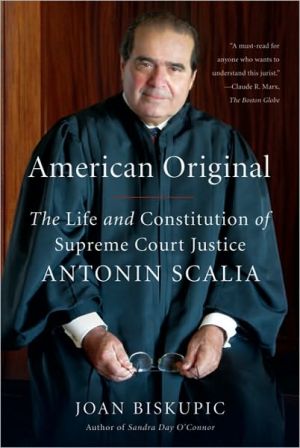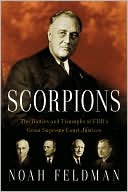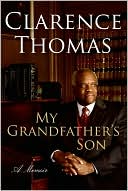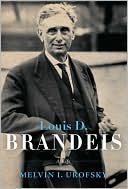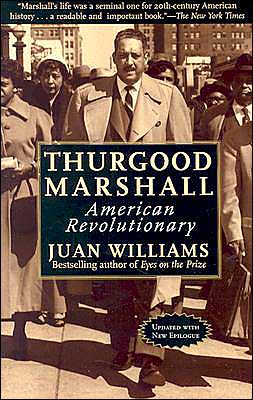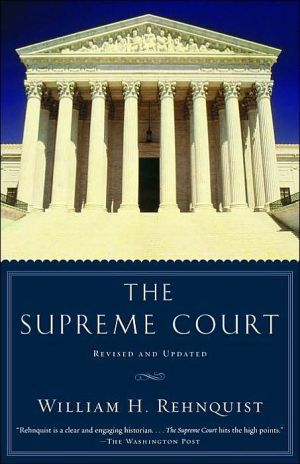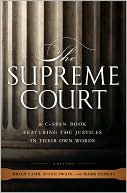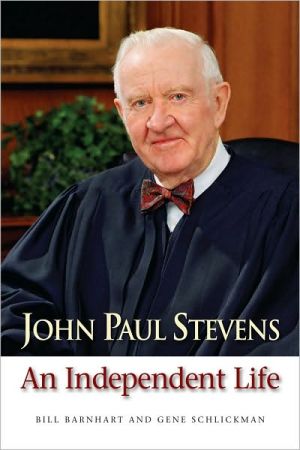American Original: The Life and Constitution of Supreme Court Justice Antonin Scalia
If the U.S. Supreme Court teaches us anything, it is that almost everything is open to interpretation. Almost. But what’s inarguable is that, while the Court has witnessed a succession of larger-than-life jurists in its two-hundred-plus-year history, it has never seen the likes of Supreme Court Justice Antonin Scalia.\ Combative yet captivating, infuriating yet charming, the outspoken jurist remains a source of curiosity to observers across the political spectrum and on both sides of the...
Search in google:
If the U.S. Supreme Court teaches us anything, it is that almost everything is open to interpretation. Almost. But what’s inarguable is that, while the Court has witnessed a succession of larger-than-life jurists in its two-hundred-plus-year history, it has never seen the likes of Supreme Court Justice Antonin Scalia.Combative yet captivating, infuriating yet charming, the outspoken jurist remains a source of curiosity to observers across the political spectrum and on both sides of the ideological divide. But for all his public grandstanding, Scalia has managed to elude biographers—until now. In American Original: The Life and Constitution of Supreme Court Justice Antonin Scalia, the veteran Washington journalist Joan Biskupic presents for the first time a detailed portrait of this complicated figure and provides a comprehensive narrative that will engage Scalia’s adherents and critics alike. Drawing on her long tenure covering the Court and on unprecedented access to the justice, Biskupic delves into the circumstances of his rise and the formation of his rigorous approach on the bench. This book shows us the man in power: his world, his journey, and the far-reaching consequences of a transformed legal landscape. The Barnes & Noble Review "Do you think he even knows the rest of us are here?" old-school Nixon appointee Lewis F. Powell whispered in 1986 to his fellow Supreme Court justice, the legendary Thurgood Marshall. Both men were looking on as their newest colleague grabbed the chance to play pit bull. Greenhorns on the nation's high court usually put obsequiousness first and assertiveness second, but not Antonin "Nino" Scalia. Joan Biskupic's American Original: The Life and Constitution [nice touch] of Supreme Court Justice Antonin Scalia documents how little her subject has mellowed. You'd have to go back to indiscreet FDR pick William O. Douglas -- Scalia's opposite in ideology and lifestyle, but his match in passion -- to name the last associate justice with this much dramatic impact.
AMERICAN ORIGINAL\ The Life and Constitution of Supreme Court Justice Antonin Scalia \ \ By JOAN BISKUPIC \ FARRAR, STRAUS AND GIROUX\ Copyright © 2009 Joan Biskupic\ All right reserved.\ ISBN: 978-0-374-20289-7 \ \ \ Prologue\ On a raised dais at Washington's luxurious Mayflower Hotel, the Supreme Court justice Antonin Scalia is in high performance mode. His comic timing is precise. Laughter and applause ripple on cue from the five hundred lawyers packed into the ballroom. Gone in an eyeblink is most of his scheduled hour. The moderator announces that there will be one final question. \ "Make it easy," Scalia jokes, standing at the lectern, in especially fine spirits on this blustery November afternoon. "You can make it like Senator Strom Thurmond's first question to me when I was up for my confirmation." The South Carolina Republican had presided over the Senate Judiciary Committee hearings for Scalia in 1986, when he was nominated by President Reagan for elevation from a federal appeals court. Thurmond had opened with a question that played right into Scalia's view that judges were wrongly going beyond the letter of the law to solve society's larger problems, whether they related to school busing, prison crowding, or environmental catastrophes. These were conflicts Scalia believed should be left in the domain of elected lawmakers.\ "'Now, Judge Scalia,'" Scalia says, mimicking the slow patois of Senator Thurmond, "'what do you think ofjudicial activism?'"\ Scalia turns sideways at the lectern and puts his hands together as if at the plate and ready to swing a baseball bat. The sleeves of his dark suit yank up, flashing his thick white shirt cuffs.\ "I'm ready for that pitch," he says.\ The Scalia illuminated by camera lights at this closing session of the 2008 annual conference of the Federalist Society is heavier than the man America first saw at the witness table in 1986 on nationwide television. His jowls are thicker, his waist wider. His dark black hair has thinned. Yet his eyes are lit, as always. Into his seventies, Scalia still exudes energy and passion. His gestures are operatic. He points his fingers and waves his arms for emphasis. His audiences at these public occasions, irrespective of whether they are conservative or liberal, continue to be large and are nearly always captivated. When Scalia enters a room, cameras still flash. This afternoon at the conservative legal society's convention his audience is standing room only and hanging on his every word and gesture.\ With his biting humor, Scalia has been advancing the legal theory known as "originalism"-insisting that judges should render constitutional decisions based on the eighteenth-century understanding of the text. "It's a fight worth making," he says in remarks that are part battle cry, part assertion of victory.\ "I used to be able to say, with a good deal of truth, that you could fire a cannon loaded with grapeshot into the faculty lounge of any law school in the country and not strike an originalist," Scalia says, referring to those of the view that the Constitution has a "constant" meaning, one that does not change to fit the needs of a changing society. "That no longer is true. Originalism-which once was orthodoxy-at least now has been returned to the status of respectability."\ He says that until contemporary times-"the last fifty years or so"-judges interpreted the Constitution to mean what it meant when it was adopted. Whether the originalist view remained "orthodoxy" into the twentieth century is debatable, but it was barely in evidence by the late 1950s as such judges as Chief Justice Earl Warren interpreted the Constitution to contain broad principles that could be applied to modern circumstances. These judges did not feel constrained by the framers' understanding of what they had forbidden or allowed.\ Gripping the sides of the lectern with his large, square hands, Scalia has been recounting how his view of a "static" Constitution has been faring better among federal judges these days. He refers with satisfaction to a recent landmark of his own Supreme Court that declared that the Second Amendment protects an individual's right to bear arms. The ruling the previous June, written by Scalia, overturned decades of decisions by lower court judges who had held that the Second Amendment applied only to state militias, such as state national guards. It was the first time the Supreme Court found that any law violated the Second Amendment, and it was a significant reversal of settled lower court law. Especially striking was Scalia's authorship of the opinion. His no-compromise style had made him a hero on law school campuses but usually cost him votes among the justices. On the incendiary subject of gun rights, however, he was able to gain and keep the majority, helped by the youthful new chief justice, John Roberts, and the newest associate justice, Samuel Alito. The case, requiring interpretation of the Second Amendment's text and history, was the perfect match for Scalia's focus on the original intention of the men who drafted and ratified the Constitution.\ "Maybe the original meaning of the Constitution is back," Scalia tells the Federalist Society. "We're not all back there yet, but maybe we're on the way."\ A quarter century into his judicial odyssey, Scalia may be at the apex of his influence. Roberts and Alito, who had both worked in the Reagan administration, have long admired Scalia and the way he wages the good conservative fight. On the Court since 2005 and 2006, respectively, they have been voting with Scalia more than did William Rehnquist, the previous chief justice, and Sandra Day O'Connor, Alito's predecessor, whose moderate, consensus- seeking approach constantly thwarted Scalia.\ Liberals such as Justices John Paul Stevens and Ruth Bader Ginsburg regard Scalia's ideas as perilous. They fear that if they were ever fully accepted by the nation's judges, the emphasis on individual rights established in the last half century-for the poor, the disenfranchised-would be lost.\ Today in the chandeliered ballroom, however, Scalia is among the faithful, with his own. In 1982, when the Federalist Society was founded by students at Yale University and the University of Chicago to counter the liberalism of academia, Scalia was present. He was teaching at Chicago and became the faculty adviser to the founding students there. He helped the group raise money and attract prominent speakers. As the Federalist Society began to flourish, gaining wealth and adding members, Scalia was an A-list invitee for annual conferences. Now the society boasts up to forty thousand members and a record of influence, with three Republican presidents and their life-tenured appointments to federal courts.\ Two years before this occasion at the Mayflower, the Federalist Society celebrated Scalia at a black-tie dinner for his twenty years on the Supreme Court. "Over the last twenty years, Justice Scalia has done for the Court what President Reagan did for the presidency and the country," declared the Northwestern University law professor Steven Calabresi, one of the founding students at Yale. "He has by the force and clarity of his opinions become a defining figure in American constitutional law of the last two decades."\ Scalia had marched up to the stage, joined by his wife, Maureen, and all nine of their children. They smiled brightly, all grown-ups, yet jostling one another good-naturedly like children who had just emerged from a long trip in the family van.\ "I really do much better at responding to criticism than at responding to praise," the man of the hour had said. "If you accept it as though it's really due, you're being conceited. If you reject it, you are being supposedly insincere or at least ungrateful. My favorite response has been one Lyndon Johnson used ... 'I wish my parents could have been here. My father would have been proud and my mother would have believed it.'"\ Scalia grew up an only child, the son of Salvatore Eugene Scalia and the former Catherine Panaro. Remarkably, he was also the only offspring of his generation from the entire Scalia and Panaro families. None of his mother's six siblings had a child. Neither did his father's only sibling, a sister. So "Nino," as he was called, became the center of attention for two tight-knit, striving Italian immigrant families. His father had come to America knowing little English, had earned a Ph.D. at Columbia University, and had spent three decades teaching Romance languages at Brooklyn College. The son did not let him down. He was valedictorian at New York's Xavier High School, first in his class at Georgetown University, and a magna cum laude graduate of Harvard Law School. A man of pride and ambition, Scalia advanced quickly through jobs in the Nixon and Ford administrations before ending up at the University of Chicago and then on the federal appeals court in Washington, D.C.\ Onstage that night in 2006, Scalia saluted the next generation of his family. He motioned to his nine children-one, a priest wearing his collar, another, an army officer in uniform-and his wife, Maureen, the Radcliffe coed whom he had met while at Harvard and married in 1960. The justice called her "the product of the best decision I ever made, the mother of the nine children you see, the woman responsible for raising them with very little assistance from me ... And there's not a dullard in the bunch!"\ That was his moment in 2006. Now, in 2008, the jurist who is a combination of Felix Frankfurter and Luciano Pavarotti, entering the third act of his judicial career, is enjoying an encore. The Federalist Society is celebrating him as it does nearly every year in some way; this late Saturday afternoon there's less glitter than at the society's famously sumptuous dinners but no less gusto. Scalia's visage, bigger than life, is projected on a large screen to his right as he speaks at the Mayflower Hotel lectern.\ The moderator, Leonard Leo, the executive vice president of the Federalist Society and an old Scalia friend, has been reading questions for the justice that have been penciled on small white cards and handed up from the audience. Someone asks whether the originalism approach has any theoretical flaws. Scalia pauses at first, seemingly struggling to find any shortcomings. Then, in response, he says that it is difficult for today's judges to know how the Constitution's drafters would respond to contemporary phenomena such as the Internet. He cautions that originalism is not perfect, yet adds, "But whatever our problems are, they pale next to the problems of the idea of the 'Living Constitution.'"\ Another questioner notes that Scalia has called himself "a fainthearted originalist." Oh, that was so long ago, the justice responds, referring to a 1989 law review article he wrote. Scalia explains that he had used "faint-hearted" because he did not see how he, or any other judge, could vote to uphold, say, ear notching of criminals, as was allowed in the eighteenth century. If he were a true originalist, Scalia says, he would have to find ear notching today perfectly constitutional despite the Eighth Amendment ban on cruel and unusual punishment. Then he quips to the Federalist Society home crowd that maybe he could be a complete originalist these days: "I've gotten older and crankier." The audience laughs heartily.\ A law student sends up a question asking what a Federalist Society member should do "in the face of militant or intolerant law professors or peers." Although the conservative legal group has developed legions of members across campuses, in law firms, and at government institutions, liberalism still dominates in law schools.\ Equally significant, national politics has shifted dramatically away from conservatism. Just three weeks before the conference, on November 4, 2008, Barack Obama was elected president of the United States. This was a milestone, foremost because Obama became the first African American president, but also because his election was widely seen as the end of an era of conservatism.\ In spite of that, this Federalist Society occasion is not solemn or melancholy. It is a celebration of the judicial victories that still can be claimed. Supreme Court justices reside in their own realm. At the taproot of the American legal system, the conservative legacy of three Republican presidents is still dominant, and Scalia is its central figure. It could be years before President Obama's judicial appointees are able to change the tenor of the law.\ Scalia also knows how to make headway against prevailing winds. He boasts that "one of my charms is that I tell people what they don't like to hear." Comfortable with tension and relishing debate, his rhetorical style is combative. But he does not enter every fight. He rebuffs criticism that his decisions are inconsistent or driven by a desire to achieve conservative goals. "I often come to decisions I don't like," he insists. He mentions that as a policy matter, he has endorsed deregulation of markets, but as a judge, he has voted to uphold regulation when federal law required it. Scalia often reminds audiences that he voted to strike down laws banning flag burning as political protest, although personally, "I don't like scruffy, bearded, sandal-wearing people who go around burning the United States flag."\ In response to the question about how to fight a disapproving professor, Scalia, a Roman Catholic, first jokes, "My mother used to say, 'Offer it up!'" Then he tells the audience: "Most of the professors I know ... would welcome someone from the other side-who can serve as a foil-because they think they can beat you. That's why they publish my dissents in their casebooks!\ "The harder question is, 'What do I do when it comes to writing the exam? Do I give him the answer he taught me to be the right answer?'" Scalia pauses for effect. "Yeah," he said. As his audience chortles, Scalia adds that it is best to save real protest for another day. "Wily as a serpent," he advises with a sly smile.\ Now Scalia takes that final question, the one he is waiting to knock out of the park.\ Reading from a white card, Leonard Leo asks Scalia how he reconciles his differing opinions in two well- known disputes, the 1995 United States v. Lopez and 2005 Gonzales v. Raich cases. Scalia voted in 1995 to overturn a federal law that regulated guns near schools because it trampled on state authority. Ten years later, he voted to uphold a federal drug law that voided a California policy allowing marijuana use for medical purposes, over dissenting justices' protests that the federal policy infringed on the states. The 2005 case had been brought by two seriously ill women who had cultivated marijuana under California's Compassionate Use Act. For the three years since, legal analysts had been buzzing over whether Scalia abandoned his abhorrence of federal intervention simply because he opposed the legalization of marijuana.\ At the Court in 2005, Justice O'Connor had declared the two Scalia positions-forbidding the federal government to displace state choices about handgun regulation but letting it override state choices about drug laws-"irreconcilable." Justice Clarence Thomas, Scalia's usual soul mate on the law, had been equally critical of the notion that Congress could interfere with a carefully restricted marijuana law providing relief to the seriously ill. He had scoffed, "The federal government may now regulate quilting bees, clothes drives, and potluck suppers throughout the 50 states."\ The question on the little white card goes to the heart of Scalia's legacy: Is his brand of originalism simply a way to achieve conservative results? Does he talk a good game until his method fails to get him what he wants as a policy matter?\ This afternoon Scalia is not going to engage such inquiry. "Oh no," he says, grimacing. "Get another question."\ It has the ring of "Get over it!" That is Scalia's stock answer when someone in an audience wants him to address Bush v. Gore, the decision that stopped the presidential ballot recounts in Florida and gave George W. Bush the White House over Vice President Al Gore in 2000. The decision remained a political thorn in the side of the nation through Bush's two terms and, particularly for Scalia's critics, offered evidence of his willingness to abandon principle when it does not get him the outcome he desires.\ At the Mayflower, the audience laughs when he says get another question. It is a friendly laugh. To them, there is nothing wrong with his ducking a hardball.\ Leonard Leo sets aside the offending card and asks Scalia, "What's your favorite opera?"\ Oh, says Scalia, there are so many works, all so different. He throws out some personal favorites: Strauss's comic opera Der Rosenkavalier, Puccini's tragic Madama Butterfly, Verdi's popular La Traviata. Then Scalia adds, "And I like country music, too."\ As people leap to their feet and clap, he waves big and strides off.\ \ \ \ \ Excerpted from AMERICAN ORIGINAL by JOAN BISKUPIC Copyright © 2009 by Joan Biskupic. Excerpted by permission.\ All rights reserved. No part of this excerpt may be reproduced or reprinted without permission in writing from the publisher.\ Excerpts are provided by Dial-A-Book Inc. solely for the personal use of visitors to this web site. \ \
Prologue 31 A Place in the American Story 112 In the Turbulence of Watergate 333 Witness for the Executive 494 Meeting of the Minds 655 Relentless in Dissent 816 "I Have No Agenda" 997 "Is Anybody Listening?" 1228 Dilemmas of Race 1489 Passions of His Mind 18510 "A Country I Do Not Recognize" 21111 Bush v. Gore: Not Over It 23112 "Quack, Quack" 25213 The Center Chair 27614 Showman of the Bench 29915 Power in a Time of Terrorism 32116 "You Get One Shot" 344Notes 365Selected Bibliography 409Acknowledgments 413Index 417
\ From the Publisher“Joan Biskupic has done it again. Having hit a home run in her fine biography of the quintessential centrist justice, Sandra Day O’Connor, Biskupic has now hit it far out of the park with her elegant, insightful, and eminently readable account of the life and constitutional views of the most colorful justice on the Supreme Court’s right wing. For anyone who wants to understand the most influential and interesting voice of the most powerful movement in contemporary American law, this book is a must-read.” —Laurence H. Tribe, Carl M. Loeb University Professor, Harvard Law School\ “Biskupic is an old-fashioned reporter’s reporter—hard-digging, tough-minded, but even-handed. She is also a thoughtful and shrewd judge of people. She has penetrated the Supreme Court and given us a fascinating portrait of the court’s most colorful and human justice.” —Evan Thomas, editor, Newsweek\ “This is the best judicial biography I’ve ever read. Scalia, the lodestone of the modern Court, is complex, influential, difficult, and, above all—in these pages—alive.” —Richard Ben Cramer, author of Joe DiMaggio: The Hero’s Life\ “It’s hard to write a fair-minded biography of such a polarizing figure, but that’s what Joan Biskupic has done with ‘American Original’ . . . impressively balanced and well reported.” —Jeffrey Rosen, The New York Times Book Review “[American Original] will stand up over time.” —Emily Bazelon, Slate “Intellectually rigorous. . . ‘American Original: the Life and Constitution of Supreme Court Justice Antonin Scalia’ is a must-read for anyone who wants to understand this jurist.” —Claude R. Marx, Boston Globe “Biskupic has written a biography filled with fire, a book almost certain to anger Scalia's fans on many pages because she offers candid assessments of his flaws, as well as his strengths. Scalia’s detractors will find lots of material with which to demonize him even further.” —Steve Weinberg, Dallas Morning News “A gifted storyteller . . . Biskupic is tough but fair. At age 73, Scalia remains full of piss and vinegar. If you want to know where he’s likely to take his colleagues and when they’ll refuse to go along with him pick up ‘American Original.’ Don’t wait for a court order.” —Glenn C. Altschuler, Tulsa World “Impeccably researched.” —Gene Warner, Buffalo News “‘American Original: The Life and Constitution of Supreme Court Justice Antonin Scalia’ is full of strong reporting. It is scrupulously even-handed, which may irritate partisans on both sides of the Scalia divide—there are few fence-straddlers when it comes to him . . . Biskupic’s larger accomplishment is to present the recent evolution of the Supreme Court through the prism of its most colorful member.”—Jim Newton, Los Angeles Times “It’s worth checking out Joan Biskupic’s new biography of Justice Antonin Scalia—American Original. . . It’s the first real deep dive into his personal background (including his religion) and how it affects his decisions. Scalia is a critical figure on the Supreme Court, given its continuing shift to the right. And Biskupic does a great job in helping the reader understand where he’s coming from.” —Thomas Goldstein, Daily Beast, “Smart People Recommend” “The book’s real charm, however, lies in her treatment of the man. She traces the important influences on Scalia—the lessons from his immigrant parents, the centrality of his Catholic faith, the early professional experiences in the Nixon justice department—and offers a portrait of a man quite unlike any other judge. Especially against the decorous backdrop of the Supreme Court, Scalia stands out for his brashness in argument, his clever, sometimes contemptuous, prose and his willingness to express opinions in a variety of public forums. Biskupic acknowledges his intellectual brilliance but criticizes him for his tetchiness with the press, for his seeming inability to concede at least the appearance of conflicts of interest and for his willingness to depart from originalism—Bush v. Gore, anyone?—when it appears to serve his own political inclinations. Legal scholars have written more about Scalia than any other living Justice. Now, in terms of accessibility for the general reader, Biskupic gives the rest of us an inside look at what the fuss is all about . . . Every bit as provocative and entertaining as the man himself.” —Kirkus Reviews\ \ \ \ \ \ Jeffrey RosenIt's hard to write a fair-minded biography of such a polarizing figure, but that's what Joan Biskupic has done with American Original…in her impressively balanced and well reported book, Biskupic…gives Scalia his due.\ —The New York Times\ \ \ Publishers WeeklyThe combative personality of conservative judicial firebrand Antonin Scalia comes through more clearly than his philosophy in this dense biography. USA Today legal affairs reporter Biskupic (Sandra Day O'Connor) notes Scalia's contemptuous chin-flicking at the media and relaxed attitude toward torture and other controversies, but focuses on his Supreme Court tenure through a thematic survey of prominent cases. What fitfully emerges, apart from a man “confident in his views, hot in his rhetoric,” is his hostility to affirmative action, abortion rights and the “ 'homosexual agenda' ” and a fondness for states' rights, executive branch authority and gun-owners' rights, all justified by an “originalist” interpretation that hews to the bare text of the Constitution as its authors allegedly understood it. Biskupic's critical approach highlights inconsistencies in Scalia's reasoning, particularly when he went against his usual states' rights position in the Bush v. Gore decision, which settled the 2000 presidential election. But the complex, murky vagaries of Supreme Court case law are not the best format for elucidating a judicial philosophy; Biskupic gives a full account of this influential figure's doctrinaire conservatism, but the originalist doctrine itself is harder to discern. 8 pages of b&w illus. (Nov.)\ \ \ \ \ Kirkus ReviewsThe legal affairs correspondent for USA Today examines the life and legal philosophy of the Supreme Court's most colorful, combative and controversial Justice. Antonin Scalia did not invent the doctrine of originalism, but he has been its most prominent practitioner during his 22 years on the Court. Rejecting the notion of a so-called "living" or "evolving" Constitution and disparaging the influence of international law, Scalia has emerged as a conservative champion, decrying the meddlesome ways of Court colleagues "busy designing a Constitution for a country I do not recognize." Skeptical about the authority, indeed, the capacity of judges, Scalia prefers a legislative resolution of democracy's contentious issues-abortion, affirmative action, etc.-and takes a broad view of executive power. Fluently discussing the cases he has authored and those in which he has famously dissented, Biskupic (Sandra Day O'Connor, 2005) sets out the origins of Scalia's judicial philosophy and explains its increasing influence. The book's real charm, however, lies in her treatment of the man. She traces the important influences on Scalia-the lessons from his immigrant parents, the centrality of his Catholic faith, the early professional experiences in the Nixon justice department-and offers a portrait of a man quite unlike any other judge. Especially against the decorous backdrop of the Supreme Court, Scalia stands out for his brashness in argument, his clever, sometimes contemptuous, prose and his willingness to express opinions in a variety of public forums. Biskupic acknowledges his intellectual brilliance but criticizes him for his tetchiness with the press, for his seeming inability to concede at leastthe appearance of conflicts of interest and for his willingness to depart from originalism-Bush v. Gore, anyone?-when it appears to serve his own political inclinations. Legal scholars have written more about Scalia than any other living Justice. Now, in terms of accessibility for the general reader, Biskupic gives the rest of us an inside look at what the fuss is all about. Every bit as provocative and entertaining as the man himself.\ \ \ \ \ The Barnes & Noble ReviewDo you think he even knows the rest of us are here? old-school Nixon appointee Lewis F. Powell whispered in 1986 to his fellow Supreme Court justice, the legendary Thurgood Marshall. Both men were looking on as their newest colleague grabbed the chance to play pit bull. Greenhorns on the nation's high court usually put obsequiousness first and assertiveness second, but not Antonin "Nino" Scalia.\ Joan Biskupic's American Original: The Life and Constitution [nice touch] of Supreme Court Justice Antonin Scalia documents how little her subject has mellowed. You'd have to go back to indiscreet FDR pick William O. Douglas -- Scalia's opposite in ideology and lifestyle, but his match in passion -- to name the last associate justice with this much dramatic impact.\ "Why does the argument have to be dull, for God's sake?" Scalia wondered to Biskupic in 2008. It's no surprise when we learn from this first-rate biography by a veteran legal-affairs reporter for USA Today that he's a serious opera fan. Inside the Court, Scalia's scorn for playing nice has cost him majorities on more than one decision. Authorship of other opinions got reassigned when his intransigence left even simpatico colleagues unable to sign on.\ Blessedly or not, those qualities also helped deny Scalia a shot at becoming chief justice in 2005, the only time the job has been open during his SCOTUS tenure. His influence has been seismic anyway. His take-no-prisoners intellectual brio made him a hero to a generation of Reaganite ambulance stoppers, GOP acolytes radicalized by the Court's midcentury liberalism under Earl Warren.\ Two such acolytes -- Bush 43 legacies John Roberts and Samuel Alito -- now share the high bench with their rough John the Baptist. When he looks at the ultrasmooth Roberts, who seems to have been baked in a test tube for the sole purpose of winning enough Senate confirmation votes to someday declare Congress unconstitutional, Scalia could hardly be faulted for quoting Picasso's line: "You do it first, then someone else does it pretty."\ Biskupic's book is that uncommon thing, a genuinely fair-minded study of a polarizing (and still active) public figure. She's also a biographer shrewd enough to recognize sideshows when she sees them. Even though the portrait is vivid, complex, and zestily detailed, spelunking around in Scalia's innermost motives isn't her priority. Since he comes off as one of those formidable extroverts whose psychology and intellect operate in such powerful tandem as to be indistinguishable, it doesn't need to be.\ American Original makes sure nonetheless that we'll have a rich sense of his origins. Recalled as "demanding" and "severe" even by a son who's no Mister Rogers, his father, Salvatore Eugene Scalia, was an untutored immigrant who became a college professor and expert on Dante. Lacking not only siblings but even cousins -- a genuine improbability for an Italian clan in Jersey in the 1930s and '40s -- young Nino was spotlit from the start.\ He was also raised as what he's remained, a hard-core Catholic without much tolerance for such make-nice 1960s innovations as the vernacular Mass. Vatican II, he tells Biskupic with a characteristic (and likable) command of non-legal American idiom, "was not on my hit parade." In this as in all his core values, the most impressive and unnerving thing about Scalia is that he seems unable to experience or even understand doubt.\ Flash forward two decades to his first government gig. He'd compiled a predictably stellar record at Georgetown University, then rather less secularized than it is today. Next came a magna cum laude at Harvard Law, followed by a stint at a Cleveland law firm he quit just before making partner to teach at the University ofVirginia. But Biskupic thankfully treats all this as prelude. For her, Scalia's career begins with the 38-year-old's appointment as an assistant attorney general just days after Richard M. Nixon resigned the presidency in 1974.\ Liberals were exulting in their victory over the Wicked Witch. But given its role as the kiln of so much that came later, their misunderestimation of Gerald Ford's presidency as a hapless interlude may deserve a rethink. Enter a duo you know all too well: vigorous young Donald Rumsfeld, Ford's initial chief of staff before becoming his secretary of Defense, and one Dick Cheney, who took over for Rumsfeld in the West Wing. Watergate's damage to presidential authority had made both men zealots for restoring executive power, and Scalia was there with bells on. Speaking of Cheney, Scalia said later, "He knew who I was. He knew my qualifications. He knew I was on the right team."\ Scalia quickly won a feisty reputation as an undaunted defender of White House prerogatives. But Ford's 1976 defeat sent him back to private life: this time, to the University of Chicago, where his most vital legacy was to assist at the birth of the Federalist Society. Then an embryonic (just two chapters) association of conservative law students, today it's a right-wing judicial powerhouse whose effectiveness as a talent pool puts the NFL draft to shame.\ Once Reagan won the presidency, Scalia was eager to get back in harness. Being passed over for the solicitor general's job at Justice left him "bitterly disappointed" -- his words, not Biskupic's. But he soon got a plum that fit his talents better: a judgeship on the Court of Appeals for the District of Columbia Circuit. Next stop, the Supremes.\ Biskupic is at her best in how she uses Scalia's four years on the appellate bench to dramatize the shift in American courts from last outpost of the Great Society to GOP fiefdom. His opposite numbers on the D.C. Circuit were Truman appointee David Bazelon and JFK appointee Skelly Wright, both members of "a liberal old boys club" that also included the Supreme Court's surviving liberal titans. They were also both exponents of a "living Constitution" that evolved with the times, a doctrine Scalia abhorred.\ Soon dubbed "the Ninopath," he set to work propounding the drastically narrower interpretations Reaganites favored. His trademark qualities as a justice were already on full display, from the flair and pungency of his written opinions -- love him or hate him, he's his generation's most quotable jurist -- to an anti-press animus that led New York Times columnist William Safire to somewhat startlingly call him "the worst enemy of free speech in America today."\ Safire also suspected the Ninopath of playing to the White House with an eye on the next SCOTUS vacancy: "The posture of being the fiercest opponent of the First Amendment does not hurt a judge's chances." Whether or not there was any truth to that, Scalia got the nod, but what tells you how much the world has changed is that he was confirmed 98-0. A year later, Reagan's foiled nomination of Robert Bork -- Scalia's great '80s rival as judicial conservatism's intellectual white knight --launched the polarized era that cable-news viewers and both Clarence Thomas and Sonia Sotomayor can testify to.\ Naturally, the meat of American Original is Scalia's 23 years (and counting) on the high court. Readers allergic to legalese have reason to be grateful for Biskupic's lucidity as she guides us through dozens of cases. Always alert to incidentals that humanize them, she never loses track of the larger issues they dramatize or the insights they provide into Scalia's temperament.\ Instead of taking things year by year, she opts for thematic bundling -- allocating a chapter apiece to his tenure's recurring motifs, with race questions, abortion, and other ethical quandaries, and the slow expansion of gay rights in the teeth of his resistance all bulking large. Admittedly, this M.O. makes for some minor narrative confusions; we have to keep toggling between Scalia's relatively isolated first decade on the Court, which by 1996 had him so frustrated he considered stepping down, and the very different dynamic from which he benefited in the George W. Bush era. Yet it's probably the most sensible way to tackle the material, considering a chronological approach would all but guarantee missing the forest for the trees.\ The one way Scalia makes his biographer's job easier is pretty basic: he doesn't evolve. Any number of justices more reflective than he have ended up in a different place from the one they were expected to fill on the court. One famous example is Harry Blackmun, the staunch Republican who ended up not only authoring Roe v. Wade but decrying capital punishment after voting in favor of it multiple times.\ The Scalia of 2009, on the other hand -- scornful of all but the bleakest readings of individual rights, contemptuous of mandated remedies to bigotry, taking a lumberjack's view of the First Amendment, and reliably backing almost untrammeled executive power -- differs from the Scalia of 1986 only in his greater clout. A man who, as Biskupic puts it, "considered equivocation a serious character flaw," he was a hardhead incapable of putting himself in anyone else's shoes then. He's still surrounded by empty pairs of sneakers, high heels, Birkenstocks and Gitmo prison footgear today.\ Scalia unsurprisingly gets bellicose at any suggestion that his own biases and goals affect his sense of the Constitution, going so far as to maintain that his opposition to Roe v. Wade "has nothing whatever to do with my being a Catholic. It has to do with my being a good lawyer." But while even sensible pro-choicers can regret Roe's flaws of reasoning, "nothing whatever" is gilding the lily. Only a numbskull would think Scalia's religion and upbringing don't influence his views of not only abortion rights but the separation of church and state. In September 2009, for example, he was expressing his stupefaction that Jews and other non-Christians could feel excluded by a Mojave Desert war memorial in the form of a cross.\ Furthermore, as Biskupic suggests here and there -- fairly delicately, since it's a tricky subject that's gotten trickier now that no less than six justices are Catholic -- his lifelong adherence to the uncompromising tenets of the pre-Vatican II Church isn't exactly at odds with his pro-authoritarian streak. Even when his arguments hold water, to call them dispassionate would be ridiculous. "Screams!" Blackmun wrote on his copy of one early Scalia dissent, taken aback by its emotionalism. One legal commentator quoted by Biskupic puts it more tactfully, or maybe just archly: "Whatever he may represent politically, Justice Scalia is also an individual in whom constitutional theory and personal identity fuse."\ That's what makes him an unlikely poster boy for Republican claims that they're only trying to protect our founding document from the "judicial activism" he in fact robustly embodies. Variously termed "strict constructionism," "originalism" (the one Scalia likes), and "textualism," right-wing advocacy of sticking to the letter of the Constitution generally comes down in practice to lofty cover for a desired political result: reduced rights and entitlements. So does the liberal "living Constitution" rhetoric that promotes expanding them.\ One polemical advantage of the "living Constitution" argument, though, is that its deliberate vagueness as dogma makes opportunistic departures from it hard to pin down. Not so textualism, undermined in the text itself by the Ninth Amendment -- the one that says, in toto, "The enumeration in the Constitution, of certain rights, shall not be construed to deny or disparage others retained by the people." That noted nonfan of construing, Robert Bork, once disparagingly if not outright denyingly called the Ninth "an inkblot," proving textualism is as textualism does. Though the amendment had been successfully theorized into irrelevance before Bork and Scalia were born, shouldn't they be the ones insisting it means what it says it means? If they don't, that's because it doesn't suit them to.\ Even for a layman, the holes and contradictions in Scalia-style "originalism" are no chore to discern. Example: his belief that the Constitution confers large discretionary powers on the executive "by default." As legal logic, that's no different from the constitutional "penumbras" implying a right to privacy that Douglas invoked or invented to justify Griswold v. Connecticut, the birth control case that set the stage for Roe v. Wade.\ Example: Scalia's 2008 claim to the BBC that the Eighth Amendment's prohibition against "cruel and unusual punishments" applies only to "punishment for crime," making torture of enemy combatants under interrogation legit. But the Eighth Amendment includes no such qualifier. What makes the omission even more striking is that its predecessors in the Bill of Rights all do spell out what they apply to: ""In all criminal prosecutions..." (the Sixth), "In Suits at common law..." (the Seventh). The absence of any such boilerplate from the Eighth's punishment clause is a powerful clue that the prohibition is general.\ Example: Scalia often gets laughs at conservative gatherings by remindinghis listenersthat homosexuality is nowhere mentioned in the Constitution. (Neither is God, but I digress.) Yet his dissent in Romer v. Evans, the 1996 decision overturning an amendment to Colorado's state constitution that prohibited local jurisdictions from passing gay-favoring anti-discrimination ordinances, also claimed American law "allowed distinctions between homosexual and heterosexual conduct." How can it, if the Founders were mute on the topic? You'd love some originalist to explain that one.\ Example: One of Scalia's most successful crusades, upending decades of appelate and Supreme Court practice, has been to disallow consideration of any law's "legislative history" -- meaning committee reports, floor debates, and the like -- in determining its intent. Of course, the practical effect of ignoring this raft of useful indicators to what Congress might have actually had in mind is to give him more latitude, not less, to impose his own interpretation in the guise of stark fidelity to the text.\ But over the years, Scalia has buttressed his opinions with supporting "evidence" much more vaporous than legislative history -- appeals to "relevant tradition," "the historic practices of our people," and what New Yorker writer Margaret Talbot called "his own selective notion of the vox populi." Here's Biskupic's summary of his dissent in one decision that prohibited the posting of the Ten Commandments in a couple of Kentucky courthouses: "He said the nation's history and the understanding of the Constitution's drafters allowed 'acknowledgment of a single Creator.' " The nation's history, really? The understanding of the Constitution's drafters? If that's textualism, the Federalist Society is the proud owner of a bridge somewhere.\ For Democrats, the most glaring example of Scalia and his fellow conservatives' readiness to ignore their own dogma for the sake of a desired political result will always be Bush v. Gore, the 2000 decision that put W. in the White House. As Biskupic puts it, "It would be difficult to overstate how much Scalia had tried to rein in the Court's use of the equal protection guarantee" -- the provision of the Fourteenth Amendment that's been anathema to conservatives since the Warren Court's expansive readings of it -- "and how much the Rehnquist Court had been defined by its federalism decisions safeguarding state authority."\ Nonetheless, both those principles got heaved overboard for the sake of protecting Florida voters' right to vote for George Bush, whether or not they'd meant to. Tellingly, the decision included a proviso that "our consideration is limited to the present circumstances" -- meaning it shouldn't be used as a precedent, despite the awkward fact that establishing those is the Supreme Court's raison d'être. Snappish even for him, Scalia's standard reply when Bush v. Gore comes up at public forums is "Get over it," suggesting he knows perfectly well that it turned his own proudly advertised judicial philosophy into a sham.\ Whether or not we've gotten over it, it'll be a cold day in hell before we get over Nino. One of Biskupic's best stories may go a long way toward explaining why. After a speech he gave in Louisiana in 2002, Scalia met a young admirer who told him, "I've named my pet fish after you." A law prof standing nearby asked if this devotee owned fish named for the other Supremes. The answer? "No. Justice Scalia ate all the others." --Tom Carson\ A two-time National Magazine Award winner during his stint as Esquire's "Screen" columnist, Tom Carson is currently a columnist at GQ and a regular book reviewer for Los Angeles Magazine, where his work has won the CRMA award for criticism. He is the author of Gilligan's Wake (2003), a novel.\ \ \
